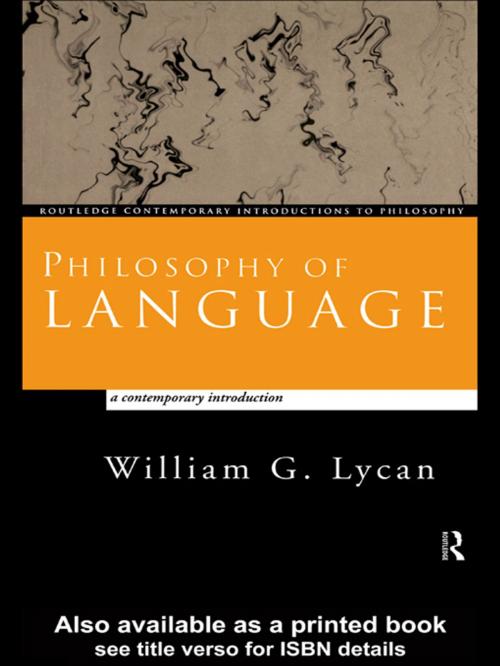| Author: | William G. Lycan | ISBN: | 9781134696048 |
| Publisher: | Taylor and Francis | Publication: | August 21, 2012 |
| Imprint: | Routledge | Language: | English |
| Author: | William G. Lycan |
| ISBN: | 9781134696048 |
| Publisher: | Taylor and Francis |
| Publication: | August 21, 2012 |
| Imprint: | Routledge |
| Language: | English |
Philosophy of Language introduces the student to the main issues and theories in twentieth-century philosophy of language. Topics are structured in three parts in the book. Part I, Reference and Referring Expressions, includes topics such as Russell's Theory of Desciptions, Donnellan's distinction, problems of anaphora, the description theory of proper names, Searle's cluster theory, and the causal-historical theory. Part II, Theories of Meaning, surveys the competing theories of linguistic meaning and compares their various advantages and liabilities. Part III, Pragmatics and Speech Acts, introduces the basic concepts of linguistic pragmatics, includes a detailed discussion of the problem of indirect force and surveys approaches to metaphor.
Unique features of the text:
* chapter overviews and summaries
* clear supportive examples
* study questions
* annotated further reading
* glossary.
Philosophy of Language introduces the student to the main issues and theories in twentieth-century philosophy of language. Topics are structured in three parts in the book. Part I, Reference and Referring Expressions, includes topics such as Russell's Theory of Desciptions, Donnellan's distinction, problems of anaphora, the description theory of proper names, Searle's cluster theory, and the causal-historical theory. Part II, Theories of Meaning, surveys the competing theories of linguistic meaning and compares their various advantages and liabilities. Part III, Pragmatics and Speech Acts, introduces the basic concepts of linguistic pragmatics, includes a detailed discussion of the problem of indirect force and surveys approaches to metaphor.
Unique features of the text:
* chapter overviews and summaries
* clear supportive examples
* study questions
* annotated further reading
* glossary.















